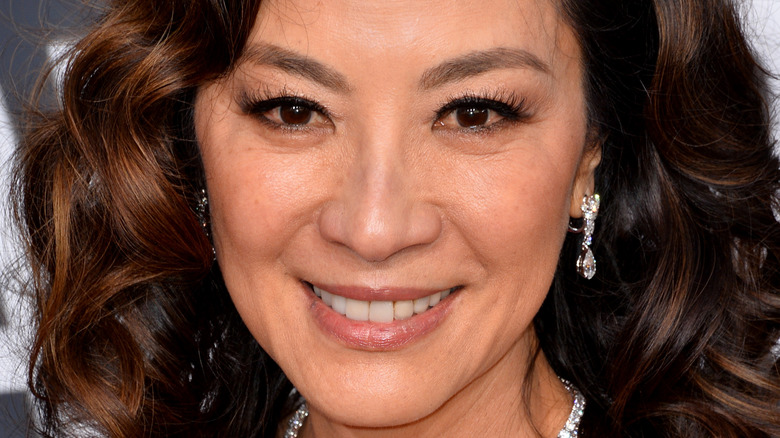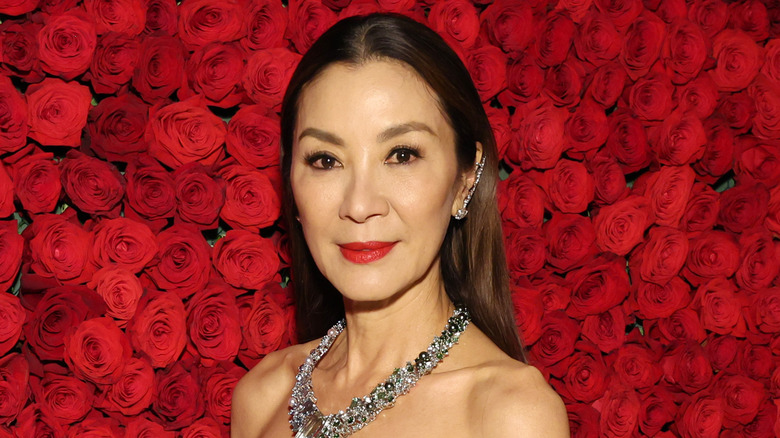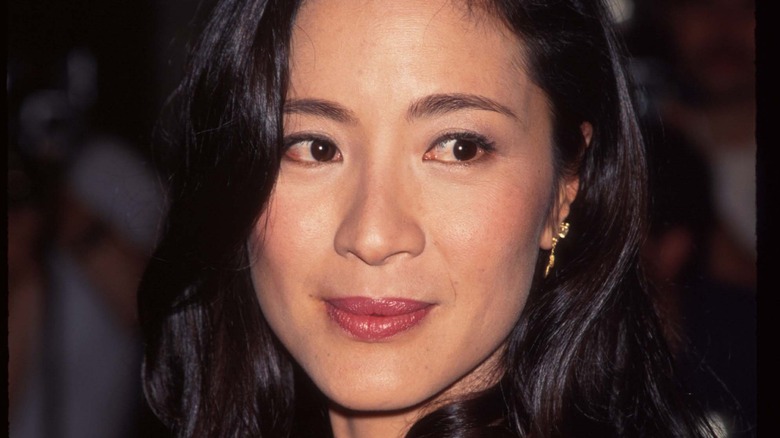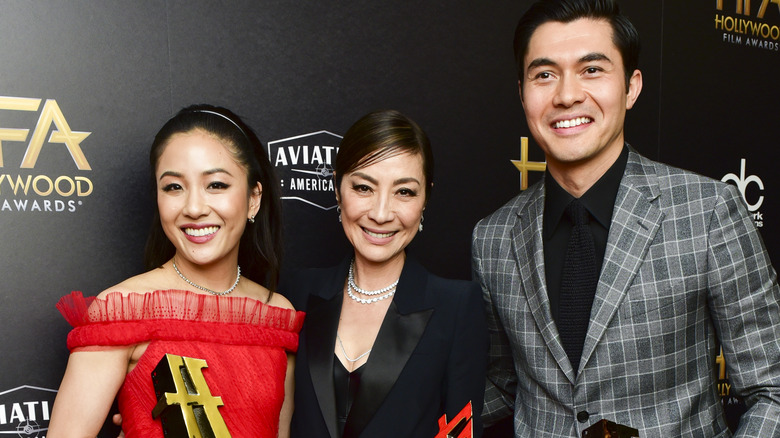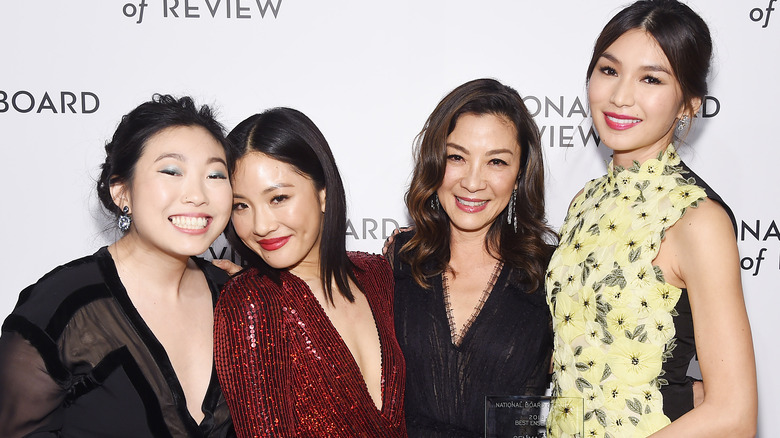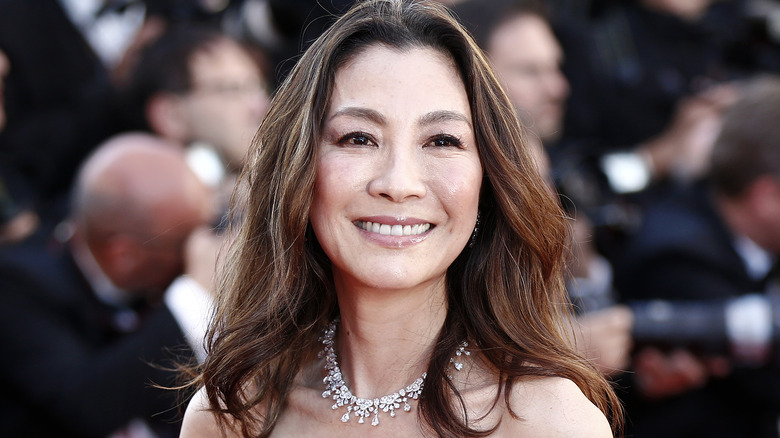Michelle Yeoh Opens Up About Being A Role Model For Asian Actors
For an independent film, "Everything Everywhere All At Once" has undoubtedly taken the world by storm (via Deadline). The same can certainly be said for its lead, Michelle Yeoh, who has been in the industry for nearly four decades. Born in Ipoh, Malaysia, Yeoh started her career in the entertainment industry as a ballet dancer (via Biography). She would eventually use her knowledge of choreography to her advantage when she became one of Hong Kong's most successful action stars.
Performing all her own stunts in films like "In the Line of Duty," "Easy Money," and "Magnificent Warriors," Yeoh quickly garnered a kickass reputation that would see her star opposite Jackie Chan in "Police Story 3: Supercop." That was quickly followed by "The Heroic Trio" and "Wing Chu," where she truly mastered her martial arts training.
In 1997, she made her Western debut as Bond girl Wai Lin in "Tomorrow Never Dies," followed by Ang Lee's "Crouching Tiger, Hidden Dragon." Despite this, it took a while for Yeoh to be recognized as a lead actress in Hollywood. "So many of us have been working on pushing the envelope and trying to make it happen, because it's very simple. We believe in us. We believe in our Asian talent," Yeoh told NBC News. "We believe all of us have stories that need to be told and need to be embraced."
Michelle Yeoh has only recently been given leading roles
Following the release of "Crouching Tiger, Hidden Dragon" in 2003, Yeoh was mainly cast in supporting roles until her iconic performance as Eleanor Young in "Crazy Rich Asians" and a recurring role as Captain Philippa Georgiou on "Star Trek: Discovery" (via IMDb). But it wasn't until "Everything Everywhere All At Once" that Yeoh was given the opportunity to play the lead. "This is the first time in many years, apart from the movies that I made in Asia, that I had the lead role," she told NBC News.
And it's her role as Evelyn Wang in "Everything Everywhere All At Once" that has made the actress realize just how much of an effect she is having on Asian audiences. "What [is special about] this moment in my career is having so many people who look like me, especially to the younger generation [of Asian actors], come up to me and say, 'Finally, I can see myself doing all these kinds of things because you are doing it,'" she told People, adding that at this point in her life she's enjoying "the fact that we are getting more opportunities and the opportunities we deserve."
Michelle Yeoh says there was no regard for Asian actors when she started out in Hollywood
Obviously, it wasn't always like this. When Yeoh first started starring in blockbusters, she didn't feel accepted as an Asian actor — despite her extensive filmography in Hong Kong. "When I first came out here, honestly, there was no regard for Asian actors," the actress told Elle. People were even surprised that she spoke English, Yeoh explained.
When asked how significantly Hollywood has changed over the years, Yeoh told the New Straits Times that "there's still a long way to go. There are too few Asian talents on screen, and I don't want us to be given token roles because of the big China market." Speaking to the South China Morning Post, Yeoh said that Asian actors are "not asking to be treated in a special way," but are simply asking for the "opportunity to go for the same things as non-Asians." She continued, "Doors were always closed to us, and Asians were not represented in the proper way — like a lot of minorities, we were stereotyped and shown in a cliched way."
Crazy Rich Asians signified a massive change for diversity
But in 2018, the release of "Crazy Rich Asians" signified a change. The romantic comedy was the first American film to feature an all-Asian cast since "The Joy Luck Club" in 1993 (via Time), and became a catalyst for films like "Everything Everywhere All At Once" and the Marvel blockbuster "Shang-Chi and the Legend of the Ten Rings."
"The fact that things have changed means that audiences are demanding that things change," Yeoh told the South China Morning Post. "That's important, as change will only occur if the audience wants it to happen." The actress feels the same way about roles for women in Hollywood, too. "The struggle for better roles and equal pay will only improve if we continue to fight for them," she explained. "Only with persistence are we able to make improvements," citing the "amazing older actresses who strengthened our cause" for the shift in focus — which includes herself.
"It's been a long battle with me right from the beginning, just to even find roles that are representations of strong women," Yeoh said during an interview with Harper's Bazaar. "So, that's why I fight constantly do to that."
Michelle Yeoh wanted to pay homage to Asian women in Crazy Rich Asians
She certainly did that with "Crazy Rich Asians," diving deep into her role as the matriarch Eleanor and making sure the character wasn't one-dimensional when judging Rachel Chu (Constance Wu), the woman her son Nick (Henry Golding) falls in love with. "It was very important why she was doing it. Why would any mother do something like that? The motivation is love, but we have to be able to show that," Yeoh told IndieWire.
Yeoh wanted to pay homage to the women around her and the women she was brought up by. "I love strong women like this, they're all around us," the actress said. "I've lived in Hong Kong for about 20 years before I moved to Europe, so I know these women. I know these mothers. I know very, very intellectual women" — women who want the best for their children, who express their love differently.
"I felt for Eleanor there were so many possibilities of expressing what mother's love is, what family is, through her character," Yeoh explained, adding that she wanted "to be able to say, 'See that's why your mother did that, that's why your mother-in-law is so tough on you, because she does want the best for her daughter or her son.'"
Michelle Yeoh has solid advice about standing your ground as an Asian actor
As Yeoh continues to change the industry with her talent, strength, and deep love for the characters she portrays. But until Hollywood becomes as diverse as the likes of "Everything Everywhere All At Once" or "Crazy Rich Asians," it's not going to change anytime soon. "Change has to be deep and wide-ranging, and it's not just down to Asians to make the changes," Yeoh told the South China Morning Post. "We need the studio heads to change, and we need more women writers, too, so there is real equality."
For Yeoh, it's about standing your ground as an actor and voicing your opinion if you don't feel the representation is correct. "It's not the actors fault that they act in some roles that make you go, 'Oh God, no, don't do that because it's a stereotype,'" she told Harper's Bazaar. "But it's the writers, it's the producers, it's those who say, 'Oh no, but that's what the audience wants.'"
What the audience actually wants is a diverse, realistic, relatable representation of the world on the big screen. "Just give us a chance to audition, a chance to go for the character. Don't put us in boxes or label us, or label anybody for that matter. Actors are actors so long as it's the right role."
